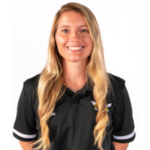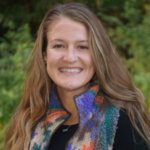Young athletes of all skill levels in grades 1-8 are invited to join us Sunday, May 19 for an exciting youth soccer clinic led by American International College (AIC) Women’s Head Coach, Stephanie Gordon. Stephanie will be joined by Meghan Dunn, Leonid Smyshlyaev, and Veronica Hardy. This is an awesome chance to have fun while learning more about the beautiful game.
Cost for the event is $40.00. Sign-in begins at 11:30 a.m., and the clinic runs from 12:00 – 2:00 p.m. Players should bring a ball and water bottle. Everyone is encouraged to wear their favorite soccer jersey!
The Pennfield School
110 Sandy Point Avenue
Portsmouth
Meet the Coaches
 Stephanie Gordon was promoted to head coach on December 16, 2021. She originally joined the staff at AIC as an assistant coach for women’s soccer on January 16, 2018.
Stephanie Gordon was promoted to head coach on December 16, 2021. She originally joined the staff at AIC as an assistant coach for women’s soccer on January 16, 2018.
During her time as an assistant coach, Gordon’s impact on the team’s defensive play has been readily apparent. AIC’s team goals allowed has dropped in each of her seasons, from 1.68 goals per game in 2018 to 1.12 in 2021. That follows from a decrease in shots allowed, which has fallen from 5.84 per game in 2018 to 4.71 in 2021.
Under her tutelage, ten student-athletes have earned Northeast-10 All-Conference honors in the previous three seasons, along with five New England Women’s Intercollegiate Soccer Association All-New England and one United Soccer Coaches All-East Region honors. In the 2023 season, Gordon led the program to the Northeast-10 post season, and a NCAA region rank.
A native of Rockland, Massachusetts, Gordon has spent her entire collegiate soccer career playing and coaching in the Bay State. She played for South Shore Select her entire club career. She spent the 2008 and 2009 seasons at Northeastern University, where she went 24-12-4 with 13 shutouts and posted a .824 save percentage, helping lead the Huskies to a Colonial Athletic Association Tournament Championship in 2008, where she was named to the All-Tournament Team. She holds the all time record for single-season save % at Northeastern, as well as single-season minutes played. The team earned a conference regular-season title the following year, with Gordon receiving Second-Team All-CAA honors, 2x defensive player of the week, and the CAA preseason selection. She transferred to the University of Massachusetts-Amherst where she was named captain for the Minutemen in 2012, graduating from the University with a bachelor’s degree in psychology in 2013. Gordon earned her MBA from American International College in 2022.
After graduating, she began her coaching career, starting as an assistant with Simmons College in 2014 before returning to her alma mater as assistant coach from 2015 through the 2017 season. She earned a United Soccer Coaches (then NSCAA) National Diploma and Goalkeeper Diploma in June 2014.
Meghan Dunn was announced as Assistant Women’s Soccer Coach on May 17, 2023. Dunn will assist in all aspects of the program.
Dunn came to AIC from Dean College, where she was both assistant women’s soccer and lacrosse coach. With both teams, she assisted in nearly every aspect of the programs, including team and individualized training, game film, social media, and administrative coordination. Six players on the soccer team earned CSC Academic All-District honors, and forward Jazzy Sztyler-Magee earned All-GNAC accolades.
Dunn graduated from Nichols College in 2018 with a bachelor’s degree in business administration. While there, she was a Dean’s List student who earned Academic All-Conference in 2015 and across 68 career games, scored 32 goals and nine assists for 73 points, including 12 game-winning tallies. She then earned a master’s degree in organizational leadership in 2021 while serving as an assistant coach for the Bison in 2020.
 Leonid Smyshlyaev: Founder of Coach Leo Soccer School
Leonid Smyshlyaev: Founder of Coach Leo Soccer School
Former Russian professional soccer player. Leonid played for Fakel Voronezh Soccer Academy U10-U17 teams and Fakel Voronezh. He has a bachelor degree in Economics from Open Moscow Humanitarian University. Leonid moved to the USA in 2006. In 2015 Leonid Smyshlyaev successfully Completed a State Soccer Coaching Course and was Qualified for a “E” National License from Connecticut Junior Soccer Association Affiliated with United States Youth Soccer Association. 2018, 2019 Middletown Gaudet Middle School Boys Soccer Team.
 Veronica Hardy is the head coach at The Pennfield School. Veronica attended La Salle Academy in high school and then received a scholarship to play Division 1 Women’s Soccer at the University of New Hampshire. She was on the America East All-Rookie Team, America East Academic Honor Roll, and won the America East Championship with her team in 2014.
Veronica Hardy is the head coach at The Pennfield School. Veronica attended La Salle Academy in high school and then received a scholarship to play Division 1 Women’s Soccer at the University of New Hampshire. She was on the America East All-Rookie Team, America East Academic Honor Roll, and won the America East Championship with her team in 2014.
